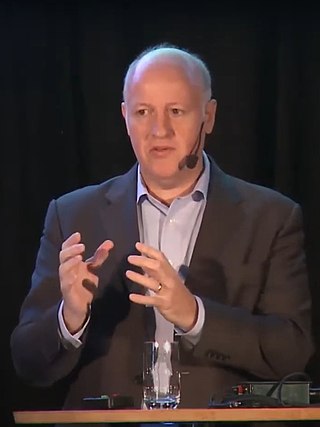Related Research Articles

Biodiversity or biological diversity is the variety and variability of life on Earth. Biodiversity is a measure of variation at the genetic, species, and ecosystem level.

Eulipotyphla is an order of mammals suggested by molecular methods of phylogenetic reconstruction, which includes the laurasiatherian members of the now-invalid polyphyletic order Lipotyphla, but not the afrotherian members.

Vampire bats, species of the subfamily Desmodontinae, are leaf-nosed bats found in Central and South America. Their food source is blood of other animals, a dietary trait called hematophagy. Three extant bat species feed solely on blood: the common vampire bat, the hairy-legged vampire bat, and the white-winged vampire bat. All three species are native to the Americas, ranging from Mexico to Brazil, Chile, Uruguay and Argentina.
EcoHealth Alliance is a US-based non-governmental organization with a stated mission of protecting people, animals, and the environment from emerging infectious diseases. The nonprofit is focused on research that aims to prevent pandemics and promote conservation in hotspot regions worldwide.

Ilkka Aulis Hanski was a Finnish ecologist at the University of Helsinki, Finland. The Metapopulation Research Center led by Hanski, until his death, has been nominated as a Center of Excellence by the Academy of Finland. The group studies species living in fragmented landscapes and attempts to advance metapopulation ecology research. Metapopulation ecology itself studies populations of plants and animals which are separated in space by occupying patches.

Soricomorpha is a formerly used taxon within the class of mammals. In the past it formed a significant group within the former order Insectivora. However, Insectivora was shown to be polyphyletic and various new orders were split off from it, including Afrosoricida, Macroscelidea, and Erinaceomorpha, with the four remaining extant and recent families of Soricomorpha shown here then being treated as a separate order. Insectivora was left empty and disbanded.
In conservation biology, latent extinction risk is a measure of the potential for a species to become threatened.

Gilean Alistair Tristram McVean is a professor of statistical genetics at the University of Oxford, fellow of Linacre College, Oxford and co-founder and director of Genomics plc. He also co-chaired the 1000 Genomes Project analysis group.

Bats are mammals of the order Chiroptera. With their forelimbs adapted as wings, they are the only mammals capable of true and sustained flight. Bats are more agile in flight than most birds, flying with their very long spread-out digits covered with a thin membrane or patagium. The smallest bat, and arguably the smallest extant mammal, is Kitti's hog-nosed bat, which is 29–34 millimetres in length, 150 mm (6 in) across the wings and 2–2.6 g in mass. The largest bats are the flying foxes, with the giant golden-crowned flying fox, Acerodon jubatus, reaching a weight of 1.6 kg and having a wingspan of 1.7 m.
Andrew Balmford is a professor of conservation science at the University of Cambridge. His research focuses on planning conservation, comparing the costs and benefits of conservation and how conservation can be reconciled with other activities.
Xiaowei Zhuang is a Chinese-American biophysicist who is the David B. Arnold Jr. Professor of Science, Professor of Chemistry and Chemical Biology, and Professor of Physics at Harvard University, and an Investigator at the Howard Hughes Medical Institute. She is best known for her work in the development of Stochastic Optical Reconstruction Microscopy (STORM), a super-resolution fluorescence microscopy method, and the discoveries of novel cellular structures using STORM. She received a 2019 Breakthrough Prize in Life Sciences for developing super-resolution imaging techniques that get past the diffraction limits of traditional light microscopes, allowing scientists to visualize small structures within living cells. She was elected a Member of the American Philosophical Society in 2019 and was awarded a Vilcek Foundation Prize in Biomedical Science in 2020.
A supertree is a single phylogenetic tree assembled from a combination of smaller phylogenetic trees, which may have been assembled using different datasets or a different selection of taxa. Supertree algorithms can highlight areas where additional data would most usefully resolve any ambiguities. The input trees of a supertree should behave as samples from the larger tree.

Stuart Leonard Pimm is an American-British biologist and theoretical ecologist specializing in scientific research of biodiversity and conservation biology.
Bat SARS-like coronavirus WIV1, also sometimes called SARS-like coronavirus WIV1, is a strain of severe acute respiratory syndrome–related coronavirus (SARSr-CoV) isolated from Chinese rufous horseshoe bats in 2013. Like all coronaviruses, virions consist of single-stranded positive-sense RNA enclosed within an envelope.

David John Beerling is the Director of the Leverhulme Centre for Climate change mitigation and Sorby Professor of Natural Sciences in the Department of Animal and Plant Sciences (APS) at the University of Sheffield, UK. He is also Editor in Chief of the Royal Society journal Biology Letters.

The Wuhan Institute of Virology, Chinese Academy of Sciences is a research institute on virology administered by the Chinese Academy of Sciences (CAS), which reports to the State Council of the People's Republic of China. The institute is one of nine independent organisations in the Wuhan Branch of the CAS. Located in Jiangxia District, Wuhan, Hubei, it opened mainland China's first biosafety level 4 (BSL-4) laboratory. The institute has collaborated with the Galveston National Laboratory in the United States, the Centre International de Recherche en Infectiologie in France, and the National Microbiology Laboratory in Canada. The institute has been an active premier research center for the study of coronaviruses.
SHC014-CoV is a SARS-like coronavirus (SL-COV) which infects horseshoe bats. It was discovered in Kunming in Yunnan Province, China. It was discovered along with SL-CoV Rs3367, which was the first bat SARS-like coronavirus shown to directly infect a human cell line. The line of Rs3367 that infected human cells was named Bat SARS-like coronavirus WIV1.

Peter Daszak is a British zoologist, consultant and public expert on disease ecology, in particular on zoonosis. He is the president of EcoHealth Alliance, a nonprofit non-governmental organization that supports various programs on global health and pandemic prevention. He is also a member of the Center for Infection and Immunity at the Columbia University Mailman School of Public Health. He lives in Suffern, New York.

Shahid Naeem is an ecologist and conservation biologist and is a Lenfest Distinguished professor and chair in the Department of Ecology, Evolution, and Environmental Biology at Columbia University. Naeem is the author of Biodiversity, Ecosystem Functioning, and Human Well-Being, and has published over 100 scientific articles.

Felicia Keesing is an ecologist and the David & Rosalie Rose Distinguished Chair of the Sciences, Mathematics, and Computing at Bard College in Annandale-on-Hudson, New York.
References
- 1 2 3 "BBC Radio 4 – The Life Scientific, Kate Jones". Bbc.co.uk. Retrieved 2015-06-25.
- 1 2 Kate Jones publications indexed by Google Scholar
- 1 2 "Prof Kate Jones". UCL Division of Biosciences. 4 March 2019. Retrieved 20 March 2020.
- ↑ "Board of Trustees – Bat Conservation Trust". Bats.org.uk. Retrieved 2015-06-25.
- ↑ "Changes at the Bat Conservation Trust - News". Bat Conservation Trust. 18 June 2014. Retrieved 20 March 2020.
- ↑ Jones, Katherine Elizabeth. (1998). Evolution of bat life-histories (PhD thesis). University of Surrey. OCLC 556734183.
- ↑ Ruz, Presented by Camila; Sample, Ian (31 March 2013). "Science Weekly podcast: The dawn of an era of de-extinction | Science". The Guardian. Theguardian.com. Retrieved 2015-06-25.
{{cite news}}: Missing|author2=(help) - ↑ "Awards Made in 2008" (PDF). Leverhulme.ac.uk. Archived from the original (PDF) on 2016-03-04. Retrieved 2015-06-25.
- ↑ "Dr Kate E. Jones | Independent Blogs". Blogs.independent.co.uk. 2011-07-28. Archived from the original on 2015-06-24. Retrieved 2015-06-25.
- ↑ "Bat Detective | A Zooniverse Project Blog". Blog.batdetective.org. Retrieved 2015-06-25.
- ↑ "Professor Kate Jones". Invisibledust.com. Retrieved 2015-06-25.
- ↑ "Prof Kate Jones's and the Bat Detective project launched plus interview on BBC World". Ucl.ac.uk. Retrieved 2015-06-25.
- ↑ "Website calls on people to become 'bat detectives' – BBC News". BBC News. 2 October 2012. Retrieved 2015-06-25.
- ↑ "Becoming A Bat Detective – Planet Earth Online – Professor Kate Jones, University College London & Charlotte Walters, Zoological Society Of London". Thenakedscientists.com. 2012-12-02. Retrieved 7 February 2017.
- ↑ Kate Jones's publications indexed by the Scopus bibliographic database. (subscription required)
- ↑ Cardillo, M.; Mace, G. M.; Jones, K. E.; Bielby, J; Bininda-Emonds, O. R.; Sechrest, W; Orme, C. D.; Purvis, A (2005). "Multiple Causes of High Extinction Risk in Large Mammal Species". Science. 309 (5738): 1239–41. Bibcode:2005Sci...309.1239C. CiteSeerX 10.1.1.327.7340 . doi:10.1126/science.1116030. PMID 16037416. S2CID 378183.
- ↑ Keesing, Felicia; Belden, Lisa K.; Daszak, Peter; Dobson, Andrew; Harvell, C. Drew; Holt, Robert D.; Hudson, Peter; Jolles, Anna; Jones, Kate E.; Mitchell, Charles E.; Myers, Samuel S.; Bogich, Tiffany; Ostfeld, Richard S. (2010). "Impacts of biodiversity on the emergence and transmission of infectious diseases". Nature. 468 (7324): 647–52. Bibcode:2010Natur.468..647K. doi:10.1038/nature09575. PMC 7094913 . PMID 21124449.
- ↑ Bininda-Emonds, O.; Cardillo, M.; Jones, K.; MacPhee, R.; Beck, R.; Grenyer, R.; Price, S.; Vos, R.; Gittleman, J.; Purvis, A. (2007). "The delayed rise of present-day mammals". Nature. 446 (7135): 507–512. Bibcode:2007Natur.446..507B. doi:10.1038/nature05634. PMID 17392779. S2CID 4314965.
- ↑ Jones, Kate E.; Patel, Nikkita G.; Levy, Marc A.; Storeygard, Adam; Balk, Deborah; Gittleman, John L.; Daszak, Peter (2008). "Global trends in emerging infectious diseases". Nature. 451 (7181): 990–3. Bibcode:2008Natur.451..990J. doi:10.1038/nature06536. PMC 5960580 . PMID 18288193.
- ↑ Grenyer, Richard; Orme, C. David L.; Jackson, Sarah F.; Thomas, Gavin H.; Davies, Richard G.; Davies, T. Jonathan; Jones, Kate E.; Olson, Valerie A.; Ridgely, Robert S.; Rasmussen, Pamela C.; Ding, Tzung-Su; Bennett, Peter M.; Blackburn, Tim M.; Gaston, Kevin J.; Gittleman, John L.; Owens, Ian P. F. (2006). "Global distribution and conservation of rare and threatened vertebrates". Nature. 444 (7115): 93–6. Bibcode:2006Natur.444...93G. doi:10.1038/nature05237. PMID 17080090. S2CID 4391288.
- ↑ "Prestigious awards honour the stars of conservation science".
- ↑ "British Ecological Society announces 2022 award winners". 2 September 2022.
- ↑ "Why more women should consider a career in science | Guardian Careers". The Guardian. 22 July 2011. Retrieved 7 February 2017.